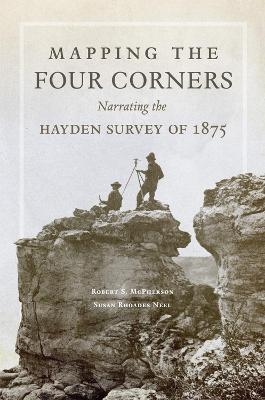
Mapping the Four Corners
Narrating the Hayden Survey of 1875
Seiten
2021
University of Oklahoma Press (Verlag)
978-0-8061-6921-7 (ISBN)
University of Oklahoma Press (Verlag)
978-0-8061-6921-7 (ISBN)
In 1875, a team of cartographers, geologists, and scientists entered the Four Corners area for what they thought would be a calm summer's work completing a previous survey. By skilfully weaving the surveyors' diary entries, field notes, and correspondence with newspaper accounts, this book brings the survey to life.
In 1875, a team of cartographers, geologists, and scientists under the direction of Ferdinand V. Hayden entered the Four Corners area for what they thought would be a calm summer’s work completing a previous survey. Their accomplishments would go down in history as one of the great American surveying expeditions of the nineteenth century. By skillfully weaving the surveyors’ diary entries, field notes, and correspondence with newspaper accounts, historians Robert S. McPherson and Susan Rhoades Neel bring the Hayden Survey to life. Mapping the Four Corners provides an entertaining, engaging narrative of the team’s experiences, contextualized with a thoughtful introduction and conclusion.
Accompanied by the great photographer William Henry Jackson, Hayden’s team quickly found their trip to be more challenging than expected. The travelers describe wrangling half-wild pack mules, trying to sleep in rain-soaked blankets, and making tea from muddy, alkaline water. Along the way, they encountered diverse peoples, evidence of prehistoric civilizations, and spectacular scenery-Hispanic villages in Colorado and New Mexico; Mesa Verde, Hovenweep, and other Anasazi sites; and the Hopi mesas. Not everyone they met was glad to see them: in southeastern Utah surveyors fought and escaped a band of Utes and Paiutes who recognized that the survey meant dispossession from their homeland.
Hayden saw his expedition as a scientific endeavor focused on geology, geographic description, cartographic accuracy, and even ethnography, but the search for economic potential was a significant underlying motive. As this book shows, these pragmatic scientists were on the lookout for gold beneath every rock, grazing lands in every valley, and economic opportunity around each bend in the trail. The Hayden Survey ultimately shaped the American imagination in contradictory ways, solidifying the idea of “progress”-and government funding of its pursuit-while also revealing, via Jackson’s photographs, a landscape with a beauty hitherto unknown and unimagined.
In 1875, a team of cartographers, geologists, and scientists under the direction of Ferdinand V. Hayden entered the Four Corners area for what they thought would be a calm summer’s work completing a previous survey. Their accomplishments would go down in history as one of the great American surveying expeditions of the nineteenth century. By skillfully weaving the surveyors’ diary entries, field notes, and correspondence with newspaper accounts, historians Robert S. McPherson and Susan Rhoades Neel bring the Hayden Survey to life. Mapping the Four Corners provides an entertaining, engaging narrative of the team’s experiences, contextualized with a thoughtful introduction and conclusion.
Accompanied by the great photographer William Henry Jackson, Hayden’s team quickly found their trip to be more challenging than expected. The travelers describe wrangling half-wild pack mules, trying to sleep in rain-soaked blankets, and making tea from muddy, alkaline water. Along the way, they encountered diverse peoples, evidence of prehistoric civilizations, and spectacular scenery-Hispanic villages in Colorado and New Mexico; Mesa Verde, Hovenweep, and other Anasazi sites; and the Hopi mesas. Not everyone they met was glad to see them: in southeastern Utah surveyors fought and escaped a band of Utes and Paiutes who recognized that the survey meant dispossession from their homeland.
Hayden saw his expedition as a scientific endeavor focused on geology, geographic description, cartographic accuracy, and even ethnography, but the search for economic potential was a significant underlying motive. As this book shows, these pragmatic scientists were on the lookout for gold beneath every rock, grazing lands in every valley, and economic opportunity around each bend in the trail. The Hayden Survey ultimately shaped the American imagination in contradictory ways, solidifying the idea of “progress”-and government funding of its pursuit-while also revealing, via Jackson’s photographs, a landscape with a beauty hitherto unknown and unimagined.
Robert S. McPherson is Professor of History Emeritus at Utah State University-Blanding Campus. He is the author or coauthor of numerous books on Navajo history and the history of the Southwest, including Under the Eagle: Samuel Holiday, Navajo Code Talker (with Samuel Holiday) and Viewing the Ancestors: Perceptions of the AnaasÁzÍ, Mokwic, and Hisatsinom. Susan Rhoades Neel is Associate Professor of History at Utah State University-Eastern; she specializes in modern U. S. history and the environmental history of the American West.
| Erscheinungsdatum | 10.11.2021 |
|---|---|
| Reihe/Serie | American Exploration and Travel Series |
| Zusatzinfo | 30 black & white illustrations, 5 maps |
| Verlagsort | Oklahoma |
| Sprache | englisch |
| Maße | 152 x 229 mm |
| Gewicht | 435 g |
| Themenwelt | Geisteswissenschaften ► Geschichte ► Hilfswissenschaften |
| Geisteswissenschaften ► Geschichte ► Regional- / Ländergeschichte | |
| Geisteswissenschaften ► Geschichte ► Teilgebiete der Geschichte | |
| ISBN-10 | 0-8061-6921-4 / 0806169214 |
| ISBN-13 | 978-0-8061-6921-7 / 9780806169217 |
| Zustand | Neuware |
| Haben Sie eine Frage zum Produkt? |
Mehr entdecken
aus dem Bereich
aus dem Bereich
Anforderungen an das digitalisierte Kulturerbe
Buch | Softcover (2023)
transcript (Verlag)
CHF 42,90
innovative Wege der Konzeption und Evaluation von Ausstellungen
Buch | Softcover (2024)
transcript (Verlag)
CHF 49,90


